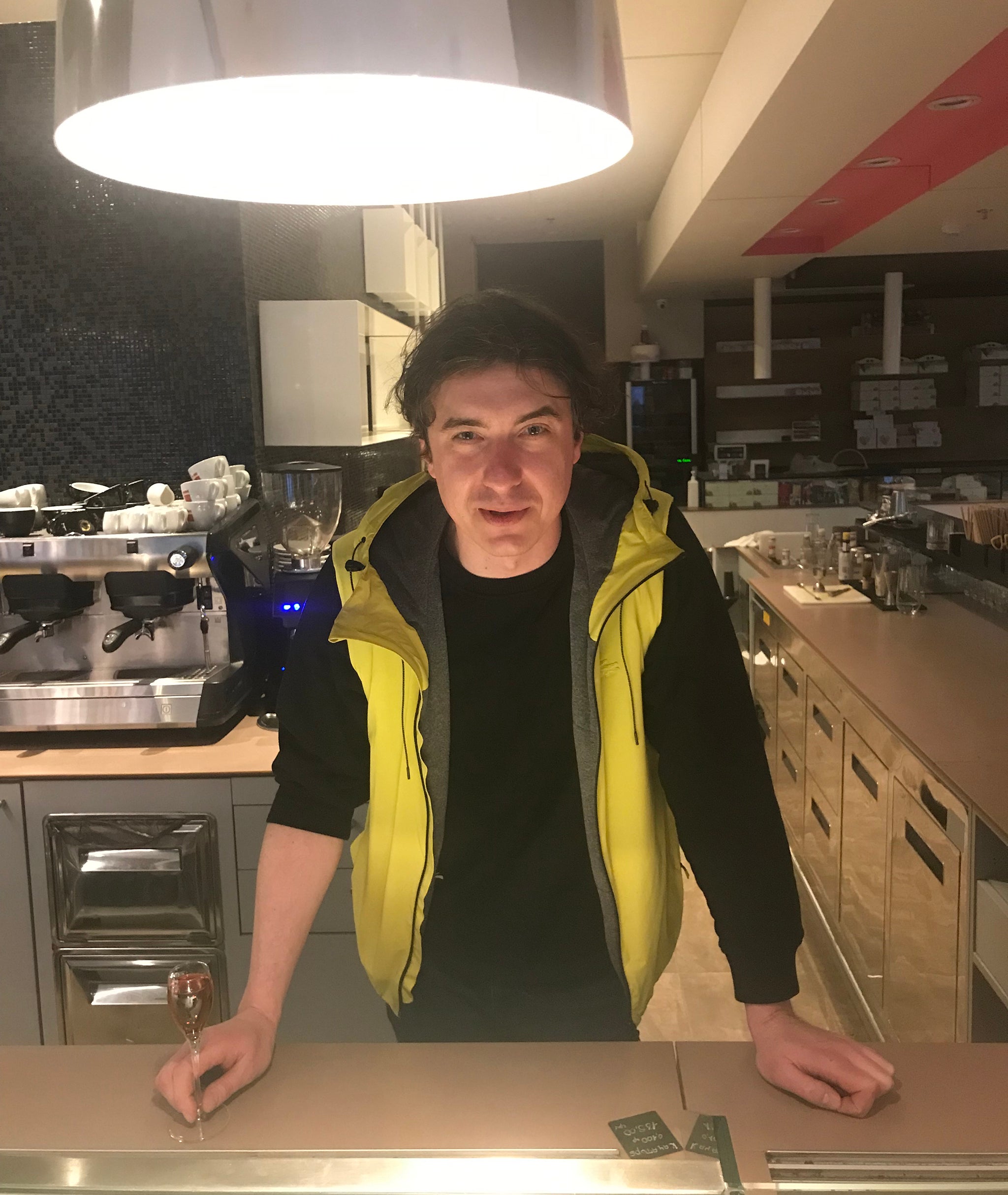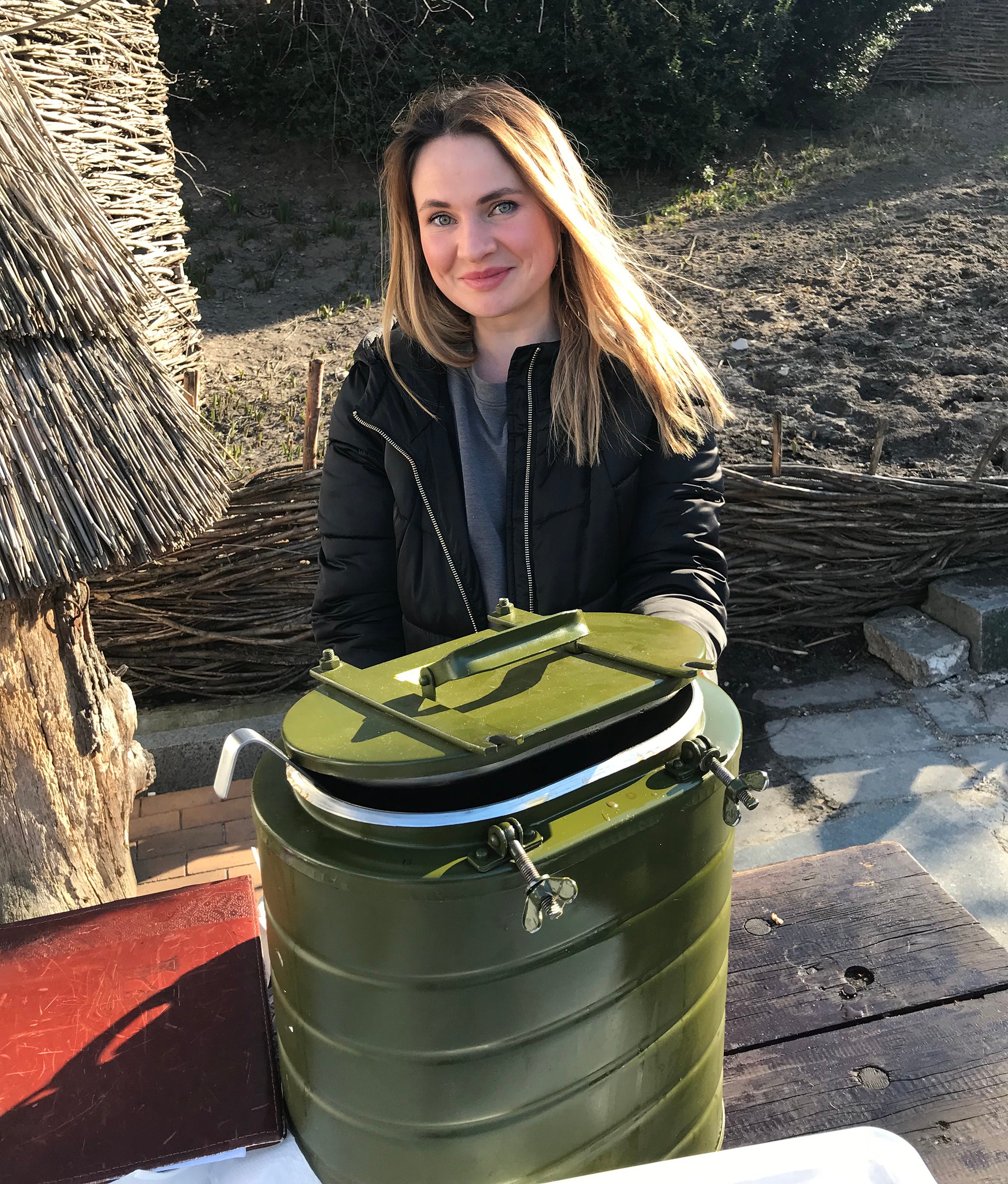
Valerie Senkevich got an urgent telephone call from her mother in Kherson saying that Russian troops had opened fire on a crowd protesting against the occupation of their city, leaving several people seriously injured.
This immediately raised concerns for Ms Senkevich about her son who had been active in the daily demonstrations confronting the troops.
“This has been my constant thought while I have been away, his safety and the rest of my family’s safety”, she says shaking her head. “It has been such a worry.”
But at least there is somewhere she can seek comfort at such times. Ms Senkevich is having lunch provided for free by Tsarske Selo, a renowned restaurant in Kyiv, part of a programme ensuring that no one goes hungry as the city faces daily Russian attacks, supplies become difficult to obtain, and very few shops remain open.
“It is so good to be with people who are so helpful in these really bad times, I really appreciate this,” she said.
“It is not just the food which is welcome, but also that you can be with others and share your thoughts, your worries, that is so important,” adds Ms Senkevich, 52, who arrived in the Ukrainian capital to look after her daughter. “I am worried about what is happening here in Kyiv with the rocket attacks and, of course, I also worry about Kherson.”
Halima Pavomiriowa, 83, is also grateful for the company as well as the borscht.
She and her family moved out to Brovary, near Kyiv, when the war started, but the town soon became a battleground, forcing a return to the capital.
“We had a little house just outside Brovary and we thought we would be safer there than here. But there was shooting, tanks, bombing all around us and it got very frightening. We got back as soon as we could,” she says. “I heard about the lunches being served here and came along and have now come again. It’s good to meet people, try to have a normal life.”

The two women are talking after the biggest attack on Kyiv had taken place the night before, flattening a 10-storey shopping mall, with eight people dead and the numbers of fatalities due to rise with dozens more buried under the rubble.
Tsarske Selo is part of a “gastro army” of the hospitality industry making and distributing food while the conflict has ended normal business.
Viktoria Lebedeva, an administration manager at the restaurant, said: “This place used to be full before Covid and when things began to open up after Covid. We had not just people in Kyiv and parts of Ukraine, but tourists coming here, foreign delegations: the staff were offered English lessons because of our international clientele.
“And then the war came and we had to shut. But we have some of the staff still here and we are producing hundreds of meals a day. We started first with the military hospital, and then others who needed support.
“People can come to eat here, or have the food delivered to their homes by volunteers. The conversation when they come is very different from before the war of course, everyone is worried about what’s happening, about themselves, about their families.”
Ms Lebedeva, 27, has her own family concerns. She left Donetsk, in the east of the country, during the separatist wars in 2014. Her mother, however, decided to stay on in the city which is reported to have been attacked in the current strife.
“I have no brothers or sisters, my mother and I try to keep in touch as much as possible. We worry about each other, she would have heard about the mall bombing in Kyiv and she would be anxious. I have tried to get through to her a few times, I will try again later,” says Ms Lebedova.
Oleksyi Kamardin also has Donetsk connections. He used to run one of the best restaurants in the city, Bassano, but left seven years ago with his family for Kyiv when the conflict began .
The restaurant in Donetsk never reopened. But Mr Kamardin opened another restaurant in the capital, with the same name and same Italian-themed cuisine which won awards and became successful and fashionable.

The last regular meal at Bassano was served on the afternoon before the start of the Russian invasion, with many customers and staff already part of the exodus out of the city. Mr Kamardin, 34, and those from the restaurant who stayed behind started producing food for those in need, shipping out 300 ready-made meals a day.
All the staff remaining in the capital – including pastry chef Anton Shtypa, who won a contest to become Chocolatier of the Year in Ukraine – have pitched in to provide the meals, as have some former regular customers.
Some of the restaurants in the scheme, like Bassano, have kept paying their staff. Getting hold of ingredients was difficult at first, but has become easier as wholesale distributors, who dropped charges, began to increase the volume of supplies.
The shutting of Bassano, and a branch restaurant in Kyiv, has cost Mr Kamardin $100,000 (£76,000) in turnover, and around $30,000 in profit, in the last 24 days. “But frankly that’s not something we can worry about now”, he says. “The main thing is that we are all pulling together at a very difficult time, everyone is willing to help. As long as can get supplies we will produce the food.”
Bassano’s branch outlet, in the city centre, is now reopening, one of the first restaurants to do so as a trickle of people, including those involved in the hospitality sector, begin to return to the capital.
“The city officials have been asking those who can open their premises to do so. It will give a little help to the economy and also be of use to the people to meet each other,” said Mr Kamardin. “We don’t know how long this war will last, but I think there is a desire among people to try and get back to something approaching normal life.”
Sofiia Dromova, a 20-year-old food technology student, used to enjoy eating at Bassano. She is now helping in the kitchen with the free meals.
“My family decided that this city is our home and we are going to stay. I don’t want to spend all my time in a [bomb] shelter,” she says. “I want to try and help, and with my interests, this kitchen seems the best place.”
The restaurants taking part in the programme range from chains, such as the LaFamiglia Group which has 14 outlets, and the Milk Bar franchise, to smaller ones, including those offering ethnic cuisine.
LaFamiglia’s managing partner, Mikhail Beylin, says his company is getting supplies free or at cost and covering addition expenditure. “We thought we may run out of food. But now the supply we get is enough to cover the demand and create a small back-up of products in case there is a scarcity,” he says.
Saathiya, an Indian restaurant, was not only providing free food but also shelter. Dozens of local people, including families with children, the elderly, students and the homeless have been staying in the premises which are set in a basement.
The owner, Manish Dave, said at the time: “It was all going very well and then the bombing started. It was frightening for everyone. A basement is a safe space in this situation, it is also quite a big space, so I felt I should help. We’ll keep it going for as long as possible.”

The restaurant has now shut. People in the neighbourhood said other shelters have been set up.
“But we miss the people in the restaurant, they were very nice and friendly,” says Youri Khomenko. “There aren’t many Indian restaurants in Kyiv and to have one in this area was good. Maybe they will reopen when the war is over, we’ll welcome them back.”
Svetlana and Viktor Yatsyna started delivering supplies to homes as volunteers for Kyiv city council when the Russian invasion began. Their 25-year-old son Eyhen died in a battle for Donetsk airport in 2015, volunteering for the army to defend, he told his parents as he went off to war, Ukrainian land.
“For us the war has been going on personally for eight years. But we never thought it would come to this, that we would be taking food to people in war in our country’s capital under fire,” says Ms Yatsyna.
“What is happening is terrible, but it is so good to see everyone helping each other. We will pull through this with this kind of unity, I am sure we will.”







